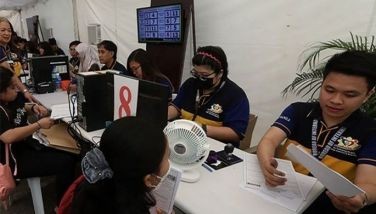COVID hampers legislative work

With barely three weeks left before the official May election campaigning starts, Congressional work is hobbled by a record-breaking rise in COVID-19 infections. The Lower and Upper chambers are holding sessions remotely to tackle remaining priority bills.
Both Houses have already lined up a good number of measures, with many at the bicameral level waiting to be reconciled, finalized, and agreed on before being brought to the Office of the President for final perusal and signing into law.
Some key lawmakers are frantically issuing a call for their colleagues to give the next session days their focused attention before sessions adjourn in favor of the campaign period. Not many are expected to diligently respond, though.
Nonetheless, we are thankful to our conscientious public servants in Congress who have laid on the table a list of the bills that need to be moved up in the legislative agenda for the sake of the Filipino people. Of more interest are proposed laws now at the bicameral stage.
Sinophobia?
Senator Frank Drilon, who will not be running for any public office during this year’s elections, has singled out the passage of amendments to the Public Service Act (PSA), as well as others like the proposed Sim Card Registration Act, the Non-Expiration of Franchise bill, AFP Modernization bill, the proposed Teacher Education Excellence Act, the Night Shift Differential Pay bill, and the proposed Judiciary Marshalls Act.
The first mentioned bill, which would provide a clearer definition of “public utility” as differentiated from “public service,” is one of the more important economic bills. However, recent statements on how the Senate version is discriminatory to Chinese investments, in particular, may delay its passage.
The Senate version reduces limitation of foreign ownership to public utilities such as electricity distribution, electricity transmission, airports, seaports, water pipeline distribution and sewerage, tollways and expressways, and public utility vehicles. However, it prohibits foreign state-owned enterprises from owning capital in a public service classified as critical infrastructure, i.e., in the interest of national security.
During an online webinar last week on the PSA, presidential spokesperson Harry Roque, who will be running for senator in the May elections, strongly voiced out: “This is discriminatory to China because, as you know, many of the companies engaged in public service, including power generation and power distribution, are state-owned enterprises.”
How this strong accusation of Sinophobia, which were in varying degrees supported by other speakers during the online webinar, will affect the bicameral debates will dictate if the proposed amendments will muster enough support from legislators before being sent to the Office of the President.
Boosting FDIs
The proposed amendment to the PSA is part of a package of legislative initiatives intended to open the Philippines to foreign investments. Of the $137 billion in foreign direct investments going to ASEAN in 2020, the Philippines managed to grab only $6.5 billion.
Many have criticized the Philippines’ attitude on foreign investments as antiquated and restrictive to its economic growth, to which the economic team of President Duterte has been working on through the introduction of new laws, like CREATE or the amendment of existing ones, like the PSA of 1936.
The Corporate Recovery and Tax Incentives for Enterprises Act or CREATE allows eligible foreign companies to apply for a reduction in the corporate income tax rate (CIT) of 25 percent (from 30 percent) until 2022, and of an additional one percent starting 2023 until it reaches 20 percent by 2027.
While CREATE is still not by any means the most attractive package offered by other countries in the region, it has been welcomed by foreign businesses as a positive step by the Philippines in reforming its regulatory environment to attract more investments.
Last December, the President also signed into law an amendment to the Retail Trade Liberalization Law of 2000, which lowers the paid up capital of foreign retail enterprises to $500,000 from $2.5 million. Again, the provision of this law is not close enough to what other more aggressive countries in the region give, but it’s still a step better.
Amendments to the Foreign Investment Act (FIA) were also ratified by both the House of Representatives and the Senate last December after mustering passage at the bicameral committee level; the bill is now being reviewed by the OP.
The proposed changes to the FIA include allowing foreigners to invest 100 percent equity in domestic market enterprises and to set up and own 100 percent of small and medium-sized enterprises (SMEs), except those in the foreign investment negative list.
RCEP ratification
One urgent matter facing the Senate will be its concurrent ratification of the Regional Comprehensive Economic Partnership (RCEP), which had already been ratified by the President last Sept. 2, 2021. Regarded as the world’s largest trade deal, the RCEP came into force on Jan.1.
Many businesses are calling for the Senate to ratify the RCEP, but strong opposition from a number of non-government agriculture-based organizations calling for the abandonment of the trade pact has been seen as a reason for the inaction.
The RCEP involves the 10 ASEAN member countries and their largest free trade agreement partners, namely China, South Korea, Japan, Australia, and New Zealand.
Including the Philippines, the other three ASEAN members who have not ratified the RCEP are Myanmar, Malaysia, and Indonesia. However, the latter two have assured its concurrence to the trade pact after fulfilling some legal requirements in their respective countries; Myanmar is in the midst of a political upheaval.
Facebook and Twitter
We are actively using two social networking websites to reach out more often and even interact with and engage our readers, friends and colleagues in the various areas of interest that I tackle in my column. Please like us on www.facebook.com/ReyGamboa and follow us on www.twitter.com/ReyGamboa.
Should you wish to share any insights, write me at Link Edge, 25th Floor, 139 Corporate Center, Valero Street, Salcedo Village, 1227 Makati City. Or e-mail me at [email protected]. For a compilation of previous articles, visit www.BizlinksPhilippines.net.
- Latest
- Trending






























